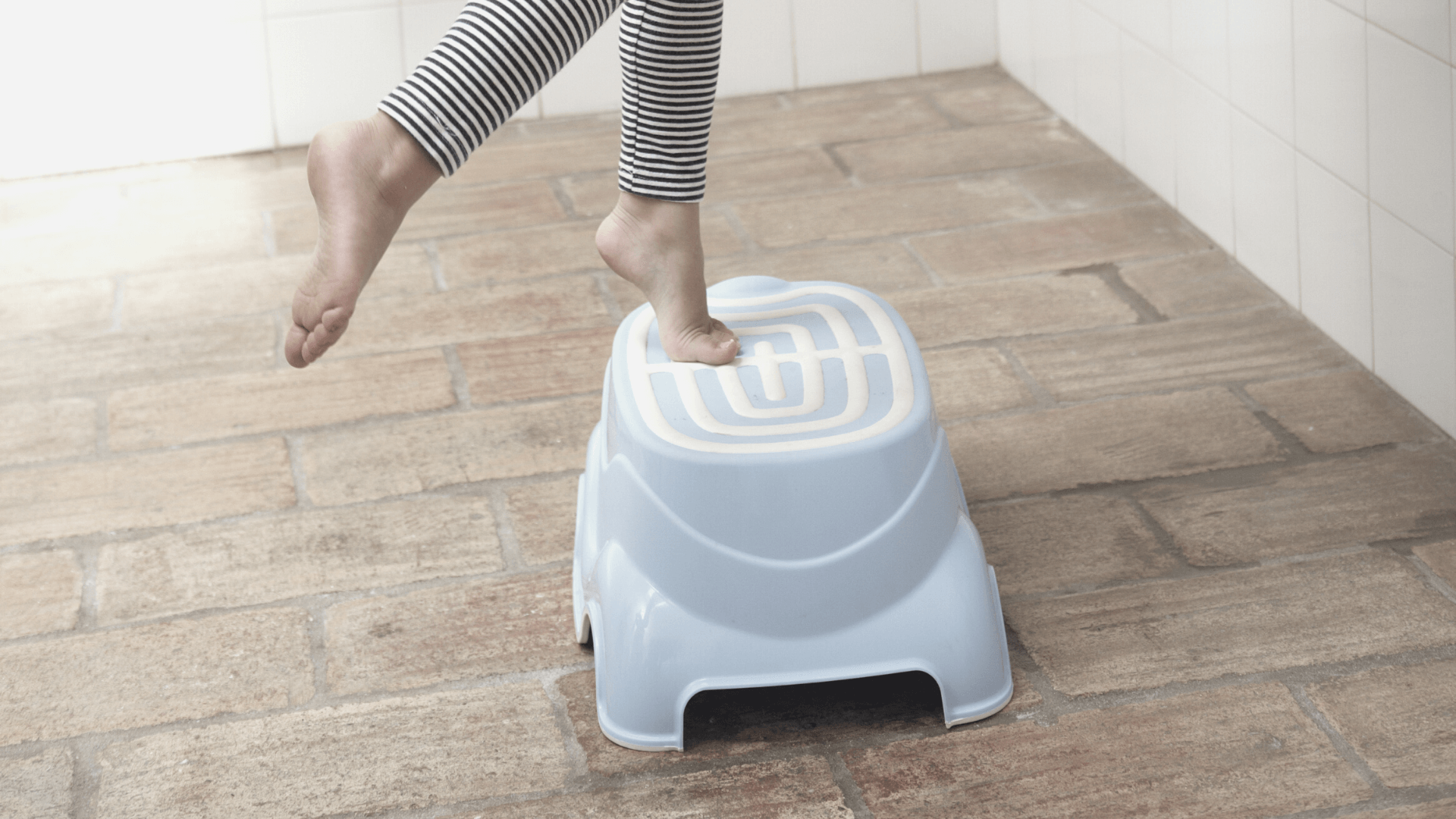Suffering with chronic constipation and bloating because you can’t seem to go to the bathroom? Increasing bowel motility might be the secret that unlocks that back door 🙂
What Exactly IS Motility?
Before we dive deeper into this conversation, I want to explain what motility is in the simplest way possible.
Let’s go back to my post on Your Digestive System.
In the post, there was a paragraph which stated,
In a healthy gut, food moves through the GI tract through a process called peristalsis, which is a wave-like movement that helps push food forward. Other things contained in the GI tract help the process as well; chewing, digestive juices, stomach acid, bile, saliva, and enzymes.
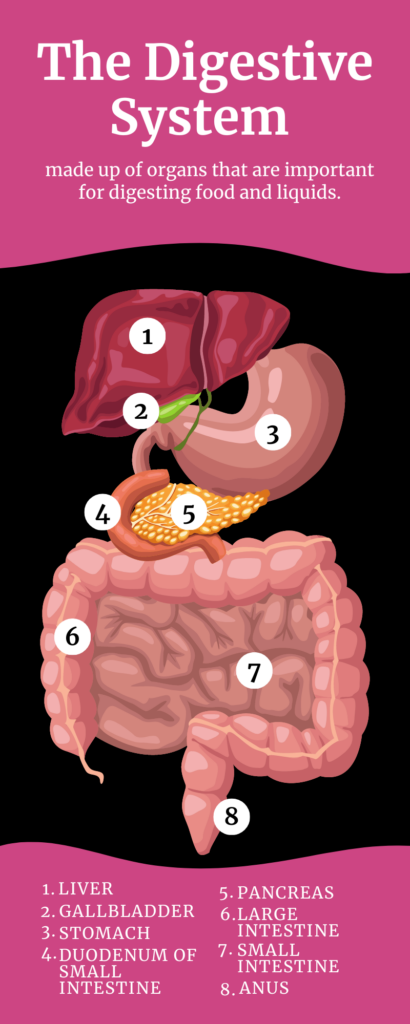
That process, peristalsis is also known as stomach (or gastric) motility.
When functioning appropriately, the muscles in the intestinal walls contract and release. This pushes food (aka ‘bolus’) from the esophagus to the stomach, through the intestines and then out.
But when stomach motility is not working as it’s supposed to, those muscle contractions don’t work appropriately and the digestive transit is also inherently off.
This means that food doesn’t pass through the intestines properly, causing slow gut motility.
When GI motility functions appropriately, it will, without a doubt, have a positive and significant impact on your overall digestive health.
What Causes Stomach Motility Issues?
In order to fix a problem, you need to understand the cause of that problem.
There are probably a hundred different causes for stomach motility issues.
The culprit could be found at almost any point within the digestive system.
But many times, the cause is associated with a condition. So if you’ve been diagnosed with any of THESE 15 associated stomach motility conditions, oftentimes you’ll be able to identify the cause.
Other things that can cause motility issues and lazy bowel syndrome include:
- restricted eating patterns
- eating disorders, such as anorexia or bulimia
- irritable bowel syndrome (IBS)
- use of narcotics
- anesthesia
- reliance on laxatives
Something interesting to make note of is that you likely just read through the list and saw yourself in one or more of them, namely the reliance on laxatives because you have felt so desperate and didn’t know any other way around it.
It’s okay. That’s why I’m here today – to help with transit time without the use of laxatives!
SIBO and Motility
One of those ways I linked to is SIBO.
SIBO stands for Small Intestinal Bacterial Overgrowth and it’s a condition where there is too much bacteria in the small intestine (when we want the majority of bacteria to reside in the large intestine).
If you’ve been bloated and constipated and have had a positive Methane breath test, there is a strong possibility you’re dealing with motility issues.
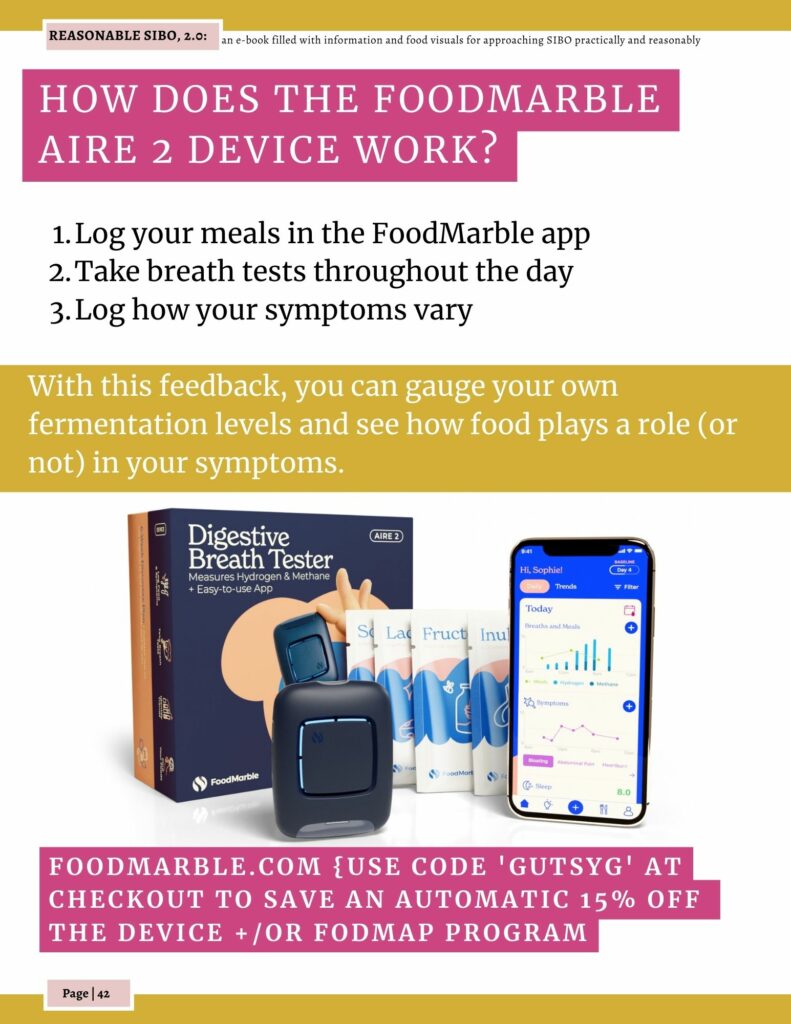
Check BOTH hydrogen AND methane levels with the FoodMarble AIRE2 Device.
Save 15% with code GUTSYG at checkout.
And while this might be the first time you’ve heard about motility as it relates to bowel function, it’s far more common than you’d think.
According to Dr. Hagmeyer,
People who have IBS-C or IBS-M or people who have had a positive Methane Breath Test usually have problems with the MMC- If your body is unable to move food, waste and bacteria down and out, and on top of it there is an issue with the ileocecal valve, then bacteria, parasites and co-infections can easily overgrow into the small bowel. Any time the MMC slow down or becomes dysregulated, you are slowing down the sweeping, cleansing actions which are so integral to GI health and immune health.
By the way, MMC stands for migrating motor complex and you can learn more about it in my post on Intermittent Fasting for SIBO.
I also mention the IC Valve HERE.
Why is Proper Motility Crucial to Digestive Health?
The esophagus, stomach, small bowel, and large intestine have their own specialized functions, but all work collaboratively to aid in digestion and motility.
Here is list of 10 consequences when gastrointestinal motility is not optimal:
- Impact overall quality of life
- Infrequent bowel movements create a downward spiral of everything from bloat to fecal impaction and even disease from bowels not moving
- Feeling full too fast
- Nausea
- Vomiting
- Abdominal pain/discomfort
- Belching
- Dysphagia
- Regurgitation
- Heartburn
Increasing Bowel Motility
Click HERE to save this article on Increasing Bowel Motility for later.
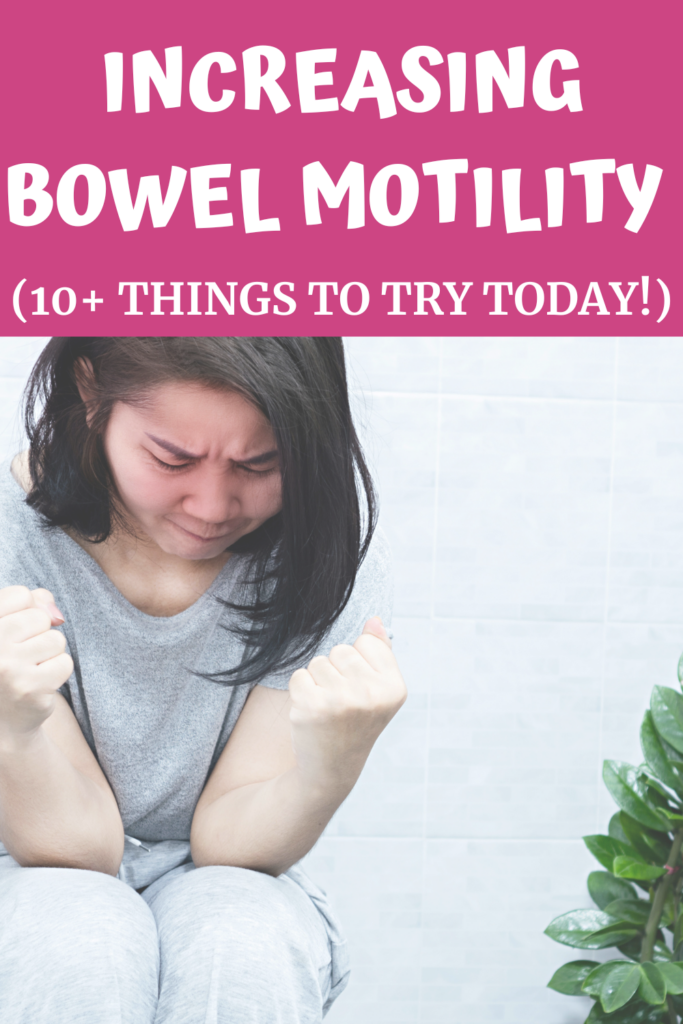
Because GI motility and functional bowel disorders such as gastroesophageal reflux disease (GERD), irritable bowel syndrome, gastroparesis, and functional dyspepsia affect up to 25% of the US population and account for up to 40% of the GI problems for which patients seek medical care, understanding how to address motility problems is critical.
Here are 10+ ways for increasing bowel motility
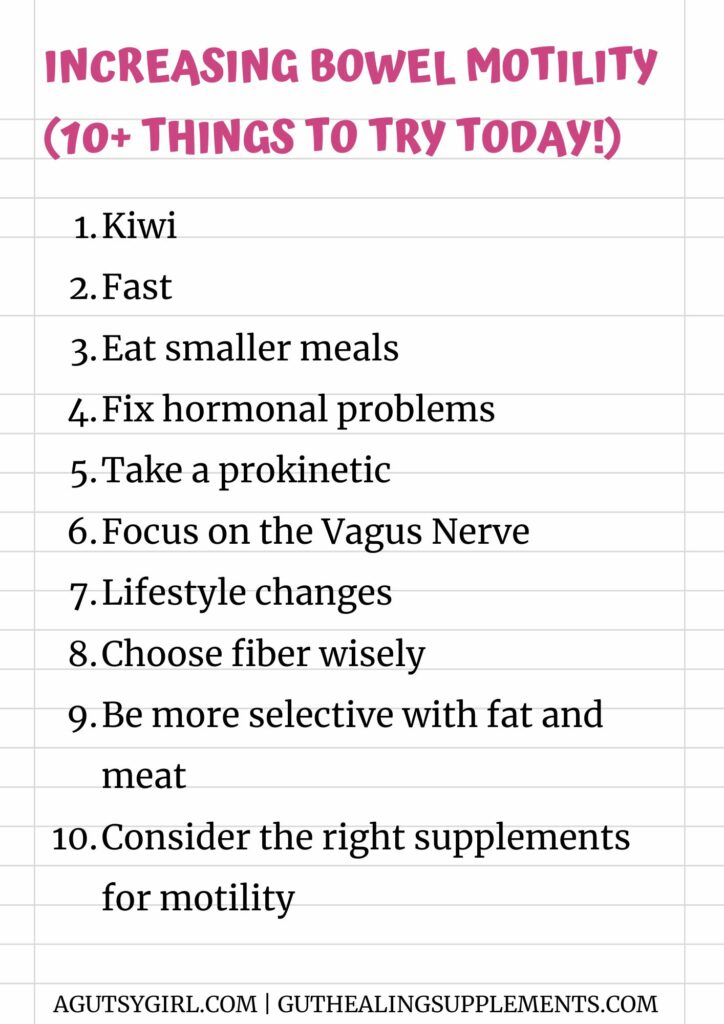
1. Kiwi
Clinical studies in a range of adult populations consistently indicate that kiwifruit are a highly effective dietary option to promote laxation. This, together with emerging evidence for the putative effects of kiwifruit in beneficially promoting gastric emptying and digesta mixing, suggests that kiwifruit are physiologically active throughout the gastrointestinal tract. (source)
2. Fast
Fasting for at least 90-120 minutes between each meal is the only way the MMC (migrating motor complex) is activated to ensure healthy transit times. The MMC’s job is to “clean house.”
There is Intermittent Fasting and Meal Spacing.
I have found massive benefits with both, experiencing general increases in overall health, but you must ensure you’re practicing them in an optimal way unique for you.
3. Eat smaller meals
Many experts will say that if you eat 4-6 smaller meals, stomach motility increases. This is likely because the average stomach empties approximately 1‐4 kcal/min.
However, I still maintain that even if you practice this, you should also ensure that 90-120 minute fast in between meals.
And/but by no means do you want to restrict overall calories. Because….
4. Fix hormonal problems
Restricting calories leads to hormone issues.
Hormones are heavily involved in the digestive process, and THIS could be an underlying root cause for why you’re experiencing intestinal motility disorders.
In fact, did you know that the effect of different foods on gastric emptying is in large part due to the hormones released from the gastrointestinal tract that provides feedback regulation of gastric emptying and healthy motility?
Learn more about GI Hormones HERE.
5. Take a Prokinetic
A prokinetic is something that stimulates movement or gastrointestinal motility. Prokinetics I have use(d) and love include: LDN (low dose naltrexone), ginger, magnesium, Iberogast, and MotiliPro.
I have put together an entire list of both pharmaceutical and non-pharmaceutical prokinetic options HERE.
6. Focus on the Vagus Nerve
Here are just 4 ways the Vagus Nerve and digestion are connected:
- The vagus nerve tells the stomach to churn the food within it, as well as to produce stomach acid that’s necessary for digesting that food and a number of other things. That’s why a damaged or under-active vagus nerve often results in low stomach acid levels and low enzyme production. In turn, this means digestion is ineffective. (source)
- The Cleveland Clinic reports, ” Vagus nerve damage can lead to gastroparesis, food not moving into your intestines.”
- This research indicates, “A significant, and growing, body of literature supports the actions of gastrointestinal luminal microorganisms to modulate gut-brain signaling via vagal afferents, the so-called microbiota-gut-brain axis. While gut microbiota might normally be expected to activate vagal afferents directly only under conditions where intestinal permeability is compromised (e.g. following inflammation or stress), luminal bacteria may activate vagal afferents indirectly, subsequent to stimulation and release of neuroactive mediators from enteroendocrine cells or gut associated lymphoid tissue (GALT). (source)
- Furthermore, the research study in #3 also states, “The GI tract receives the majority of the vagal efferent nerve fibers and harbors the most immune cells in the body.”
This is a HUGE component for which you might be overlooking.
I have an entire article all about Vagus Nerve Stimulation HERE.
7. Lifestyle Changes
Sometimes, addressing abnormal motility can be with simple things you’re overlooking:
- Chew your food. Did you know, you should chew each bite of food 30-40 times prior to swallowing? The more your teeth grind food down, the less work (= time) your digestive tract has to do.
- Drink enough water (this is critical for obtaining the daily bowel movement) but don’t drink water with meals. While you should drink more water in general for healthy digestion, drinking water with meals can dilute digestive juices and digestive enzymes and interfere with overall digestion.
- Get regular exercise (but not at super high intensity levels) + consider physical activity after meals
- Cut the alcohol! The NIH states that, ‘Chronic alcohol intake leads to intestinal inflammation, including altering intestinal microbiota composition and function, increasing intestinal permeability, and affecting the intestinal immune homeostasis.’ There are literally ZERO great reasons for drinking alcohol, even though societal standards have us believing otherwise. For the purposes of this article, high alcohol concentrations (i.e., above 15 percent) appear to inhibit gastric motility.
- Use a squatting stool! You’ve likely heard of the Squatty Potty, yes? Well, I have a tutorial on how to make your own HERE. I swear by using one!
8. Choose Fiber Wisely
A healthy diet with adequate fiber intake plays an important role in both good gut bacteria and the elimination of food.
But sometimes, you have to consider the types of fiber you’re consuming so you don’t experience the unwanted side effects of it.
Insoluble vs soluble fiber might be a better temporary option.
Dietary fiber can promote intestinal health by regulating the composition and metabolism of bacterial communities, providing energy to colonic epithelial cells, promoting the production of intestinal mucosa, stimulating intestinal motility, and maintaining intestinal integrity. source
p.s. While I know it’s common for people with motility issues to see their doctors only to have them recommend ‘fiber supplements,’ I do always caution to tread lightly on this one — for the reasons I discuss in choosing fiber wisely.
I cannot tell you how many times I personally was given that recommendation and time-and-time again it failed, leaving me feeling even more miserable.
9. Be More Selective with Fat and Meat
Both fats and meat can slow down the digestive process.
Ways to help with this include: naturally breaking down fat, using HCl, accompany heavier meals with digestive enzymes, and/or eating the fats and meats with easy-to-digest foods.
I have done all of this at various times! Note: please do not believe that fat and meat are to be vilified. For most, they are not the villain.
10. Consider the right supplements for motility
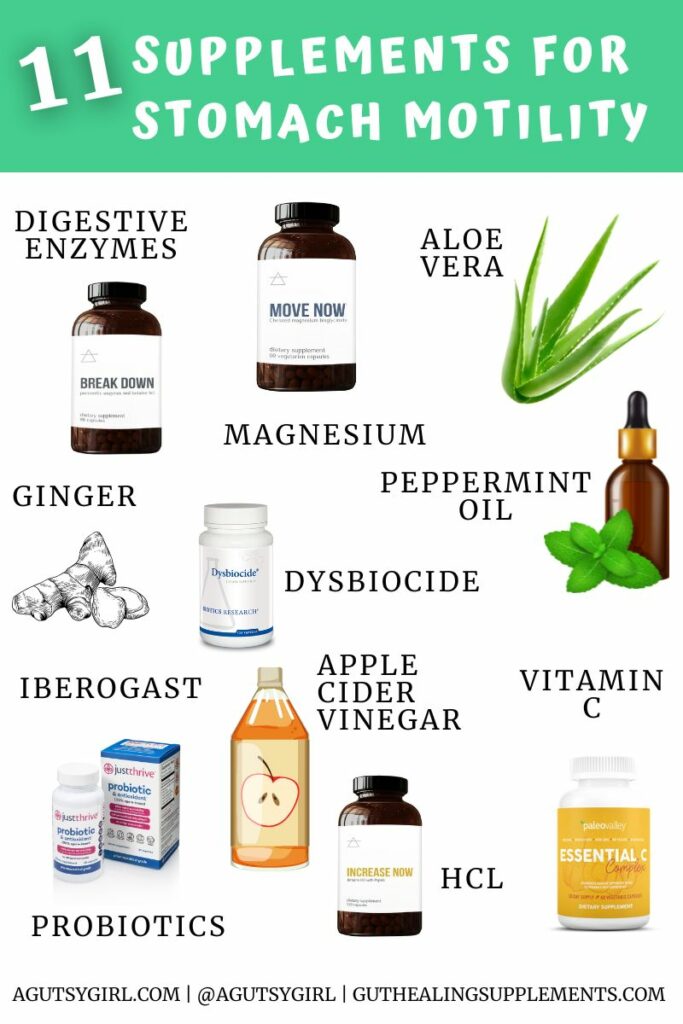
Some of these can and oftentimes do include:
- Digestive enzymes
- Magnesium
- Aloe vera
- Ginger
- Peppermint oil
- Apple cider vinegar
- Probiotics
- Iberogast
- HCl
- Dysbiocide
- Vitamin C
You can learn more about #1 – 9 HERE.
Learn more about Dysbiocide HERE.
And learn more about Vitamin C HERE.
Bloating, Weight Loss, and the Movement of Food
It’s obviously very apparent that I’m obsessed with gut health.
But maybe more so than that is my obsession with helping women get rid of the bloating and extra weight so they can know their worth and feel confident 24/7.
Part of this is addressing the gut microbiome, reducing chronic inflammation and get a regular bowel movement schedule down pact.
And BECAUSE I was once in your same shoes, but then overcame it – I am uber-passionate about teaching you HOW I did it.
If you’re tired of trying to navigate all of this on your own and you’re bloating, gaining weight, and just feeling “less than” with too much overwhelm, I have all the pieces you need to get the quick start you’re craving.
In just 21 short days, you’ll be light years ahead of where you’re at today.
IF YOU’RE LIKE THE THOUSANDS OF WOMEN WHOSE LIVES HAVE ALREADY BEEN TRANSFORMED THEN….
- You’re always “dieting,” gut healing or otherwise, but always find yourself back at square one
- You are sick of Googling, “Why am I so bloated and miserable?”
- You’re sick of going to doctor after doctor who give you nothing more than a handout for your “diagnosed condition”
So you answered (or maybe screamed!) a YES to the above and feel like you’ve tried EVERYTHING, but the results aren’t there?
I get you, I SEE you….and I WAS you.
The Quick Gut Detox is designed to….
- Get you quick results towards a healthy gut so you’re inspired. When we physically SEE + FEEL the results we are motivated to keep going.
- Calm down whole body inflammation. Bloat and weight are not the same things. But in my 40+ years on Earth I am a firm believe they both have an inflammation component.
- Lose unwanted weight (without feeling hungry). Not eating will NOT heal your gut OR make you lose weight. You can’t outrun a bad diet, BUT if your gut is healthy you’ll be able to consume all foods, freely and maintain a healthy weight.
If you’re looking to optimize your gut health so that you aren’t feeling so much bloating, gas, and ultimately weight gain, this is the best way to go about it.
Ready to join? The Quick Gut Detox is based off my very first signature program: A Gutsy Girl’s Bible: a 21-day approach to healing the gut. (NOTE: you will also receive a copy of this book for the program!)
The program has already changed thousands of women’s lives worldwide!

Let me show you the way!
Additional article sources: HERE
If you liked this article on ‘Increasing Bowel Motility’ you might also enjoy:
- Interesting Facts About the Immune System {Plus 13 Science Backed Ways to Boost Your Immune System}
- Can SIBO Cause Acid Reflux (+All About Acid Reflux)
- One of my FAVE supplements for the gut lining
Xox,
SKH
🤰 bloating be gone! weight loss through optimal gut health for women
💃ʜᴇᴀʟ ʏᴏᴜʀ ɢᴜᴛ. ʜᴇᴀʟ ʏᴏᴜʀ ʟɪfe.
🫶🏻 founder gutbyome.com




